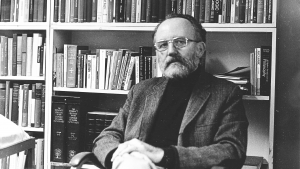Cyrus W. Banning H’94, a longtime professor of philosophy at Kenyon, died Sunday, Sept. 4, 2022. A resident of Granville, Ohio, he was 90.
Born in Hollywood, California, on July 5, 1932, Banning was the son of Elnora Roper Banning and Wayne Banning. He grew up in southern California but headed east for college, earning a bachelor’s degree at Harvard University in 1954. After serving as a sergeant in the U.S. Army from 1954 to 1957, part of that time stationed in Korea, he re-entered academe and acquired a Master of Arts (1961) and a doctorate (1965) at the University of Michigan.
Banning joined the Kenyon faculty in 1962 as an assistant professor of philosophy. He won tenure and promotion to associate professor in 1968, followed by promotion to full professor in 1976. His key areas of interests included free will and determinism as well as ethics, philosophy of science, and, in later years, philosophical issues in feminism.
“Cy Banning was a man with an admirable sharpness of mind in debate and a desire to give a fair hearing to both sides of an argument,” recalled Reed Browning H’07, professor emeritus of history. Like several other senior members of the faculty, Banning and Browning moved into a retirement community, formerly known as Kendal at Granville and now as the Otterbein Granville SeniorLife Community, after their years in Gambier.
Many students found themselves beholden to Banning for teaching them not only about philosophy but also some of the most central skills of a liberal-arts education. David Lynn ’76, who went on to teach English at the College and to edit the Kenyon Review, remembered, “Cyrus Banning was an exacting, brilliant teacher who taught me to read carefully and precisely while working my way through the challenges of Plato and Kant, among others. Just as important, he persuaded me of the deep value of such labor.”
In the 1970s, Banning served as president of Kenyon’s chapter of the American Association of University Professors. He was also a member of numerous committees, including the Great Lakes Colleges Association’s Japan Study Advisory Committee. From 1983 to 1989, he was affiliated with Kenyon’s Women’s and Gender Studies Program.
“Cyrus was an imposing presence with a razor-sharp intellect trained in analytic metaphysics,” recalled Juan DePascuale, an associate professor of philosophy who joined the Kenyon faculty in 1984. “Later in life, he took an interest in feminist philosophy and became a gentle giant, full of compassion, with a willingness to entertain all possible points of view.”
Another colleague, Professor of Philosophy Joel Richeimer, noted the important role of Banning’s wife, Margaret Banning, in his growing interest in feminism. “Margaret made Cyrus aware of the situation of women on campus and in society at large. Women’s issues and sensitivity to women became more and more an issue for him. He saw — with a growing awareness — that the situation was unfair. Watching Cyrus evolve on this issue showed that though his persona was formal, he was also a person who was open to criticism and to change.
“Cyrus was a powerful presence in the classroom, in our department, and on the campus,” Richeimer added. “His demeanor, his deep voice, his controlled speech, his clear-headedness meant that when he spoke he did it with authority. And people listened. What he had to say was always taken quite seriously. It has to be said that some students felt intimidated by him, but they did respect him. Many students — usually the better ones — admired him.”
Among the students who counted Banning as a chief mentor was the late Shelley Liane Stillwell ’73, a member of the College’s first coeducational class. At Banning’s suggestion, Stillwell went on to graduate studies in philosophy at Purdue University, where she earned a doctorate before embarking on a teaching career. She went on to serve on the philosophy faculty at Illinois State University for 32 years, and to maintain a 40-plus-year friendship with Banning, until her death in 2016.
A longtime chairman of Kenyon’s philosophy department, Banning retired from the College in 1994, at which time he was awarded an honorary doctorate in humane letters. The citation for that degree, read by his colleague Ronald E. McLaren ’58 H’01, read, in part: “You have given generations of students a rare and wonderful lesson, showing them that reason is not only the highest faculty but that it is real and alive. From your example they have learned that apparently intractable problems, however complex and subtle, however abstract and philosophical, can be made to yield to rigorous analysis.”
In retirement, Cyrus and Margaret Banning traveled widely. They continued to enjoy lively discussion wherever they found it, both at home and abroad.
Banning is survived by his wife, Margaret Newsom Banning; a daughter, Julia Banning; a daughter-in-law, Eileen Banning; and a grandson, Michael T. Banning. He was preceded in death by a son, Geoffrey Banning.
Memorial contributions may be made to Kenyon College, to Hospice of Central Ohio or to a charity of the donor’s choice.
A celebration of Banning’s life will be announced at a later date. Interment will be in the College cemetery.
